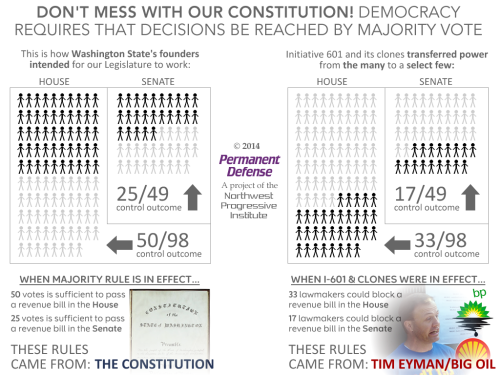May 29th, 2015
Police report, eyewitness testimony documents harassment of citizens by Eyman petitioners
Rethinking and ReframingStatements & Advisories
With Tim Eyman and his associates said to be winding down the signature drive for I-1366, Eyman’s most destructive initiative yet, NPI’s Permanent Defense has been reviewing anecdotes submitted by citizens and activists regarding their experiences with petitioners during the I-1366 signature drive.
One incident in particular drew our attention, because it illustrates that there have been and continue to be occasions where petitioners have needlessly instigated conflict with citizens by behaving inappropriately.
During the week of April 19th-25th, two petitioners most likely on the payroll of Tim Eyman and his associates selected a Trader Joe’s in Kirkland, Washington, to solicit in front of. Their objective was to intercept shoppers entering and exiting the store and get them to sign Tim Eyman’s I-1366.
Eyewitness Bob Osrowske, a resident of Kirkland who contacted NPI to report his experiences, first saw the petitioners on the afternoon of April 20th, as he was going into Trader Joe’s, around 3:20 PM. He described the older of the pair, later identified by the Kirkland Police as Robert A. Blaska, as “quite aggressive”.
During this initial encounter, Osrowske asked if I-1366 was sponsored by Tim Eyman; he recollected the younger petitioner, later identified by police as Devin M. Fox, responding by asking, “Who’s Tim Eyman?” and claiming it was merely “a conservative initiative”.
Osrowske, who correctly suspected that I-1366 is in fact a Tim Eyman initiative, declined to sign the petition and continued into the store.
Two days later, on Wednesday, April 22nd, Osrowske was again on his way into Trader Joe’s to get groceries, and witnessed Blaska and Fox intercepting shoppers in front of the store for a second time.
“They were the worst-behaved signature gatherers I’ve encountered so far,” Osrowske told NPI. “They’d get in a person’s face to get a signature, or challenge you if you had a different opinion. Courtesy was not a part of their vocabulary.”
When Osrowske came out of the store, at about 1:20 PM, Officers Karp and Miller of the Kirkland Police Department had arrived to confront Blaska and Fox after receiving a 911 call at 12:38 PM from another individual.
The police report obtained by NPI from the City of Kirkland states that the call was precipitated by the presence of “harassing solicitors outside Trader Joe’s” who were “trying to get signatures for lowering taxes”. The subjects were described by the complainant as “rude and forceful”, with one being more aggressive than the other.
Officer Karp’s narrative describes what happened next:
Robert A. Blaska (born 82) refused to move his petition table from obscuring the exit and wheelchair ramp at Trader Joe’s. We also had several complaints of him cursing at patrons. He was trespassed for one year and his partner Devin M. Fox (born 92) remained.
The incident was subsequently logged by the Kirkland Police Department as #2015-00016270.
Unfortunately, the kind of harassment that Bob Osrowske and other Trader Joe’s shoppers had to put up with that week last April is not uncommon.
Grocers and other retailers have documented many instances where petitioners have blocked store entrances and gotten in the faces of patrons. In some of these instances, the police have been summoned, as they were in Kirkland on April 22nd, because the petitioners refused to behave respectfully.
A panel organized by the Washington Food Industry Association and the Northwest Grocery Association spoke to the Senate Government Operations & Security Committee about problem petitioners at a now-infamous hearing on SB 5375 on February 5th, which was abruptly ended by committee chair Pam Roach following an exchange between vice chair Don Benton and ranking member Marko Liias.
Prior to the committee’s sudden adjournment, Republican and Democratic members of the committee spoke to some of their own experiences with aggressive petitioners during a Q&A with the panel. (The hearing can be watched on demand via TVW).
“Tim Eyman has repeatedly portrayed petitioners as the victims of harassment, but as this incident and others show, there have been many times when petitioners were the perpetrators and citizens the victims,” said NPI founder and executive director Andrew Villeneuve.
“Unfortunately, in Washington, as in many other states, it is legal to pay petitioners by the signature, which means petitioners have an incentive to be aggressive. If they can corner people and get them to sign, they make more money. Plenty of people will sign a petition just to get a confrontational signature gatherer to quit bothering them.”
“It’s definitely time for our state’s executive and legislative branches to act to clean up Washington’s underground petitioning industry. People who are being paid to gather signatures aren’t merely exercising their First Amendment rights — they’re doing a job. Their employers should be following all of our state’s worker protection laws, and ensuring they get training so that they understand how to behave appropriately when they are out collecting.”


